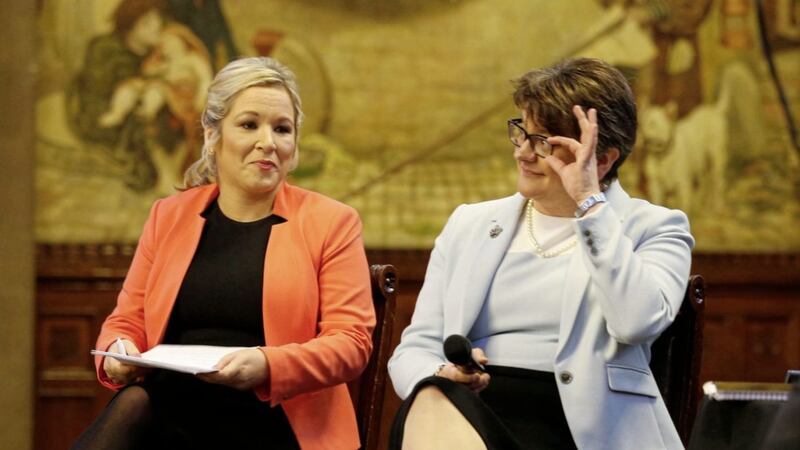THE silly season started early this year. The summer months, in which frivolous stories tend to replace hard news, began this week when Sinn Féin and the DUP argued over which party was the more inclusive.
Since both parties are exclusively sectarian, it was not just all very silly, it was sadly insincere, because it is the non-inclusive nature of SF and the DUP which has led to the current political impasse. Welcome to the world of self-delusionary politics.
The row between the two parties was illustrated by Michelle O'Neill's opinion piece in this newspaper and Arlene Foster's London speech.
With due respect to both women, neither argument was consistent with their parties' 10 years of dysfunctional rule at Stormont.
Their political self-indulgence was exposed when it was later announced that 63 schools here have lost funding to run breakfast and homework clubs for disadvantaged children. Neither party commented on this impending increase in child hunger, even though they jointly reduced education funding to where it is today.
So if we assume that both leaders composed their contributions on the well-fed stomach of an absentee MLA, who came out top of the politics class?
In terms of incoherence, Arlene was by far the better. She wrote, "Citizenship and rights are essentially unionist issues."
I have no idea what that means. Maybe she meant "unionist values"?
She then added the equally meaningless, "These are issues we should set out to reclaim."
She did not specify from whom they might be reclaimed and whether they were stolen - a sort of values-based Northern Bank job - or voluntarily handed over in an unprecedented act of political charity by an unspecified unionist donor.
Her comments make limited sense if we view them as a response to Michelle's 500-word opinion piece in which she mentioned "citizens" three times and "rights" seven times. That is one mention every 50 words, which means Michelle topped the class for repetition.
I have no idea what a rights-based society is and Arlene could have done worse than ask Michelle to explain it.
But, in keeping with much of her recent political behaviour, Arlene opted for worse.
She failed to ask how SF would build a rights-based society. Would it be founded on Aristotle's concept of natural law, or on the belief that individuals agree to give up their liberty in return for protection from the state, as argued by Hobbes?
Maybe they believe that rights are privileges afforded to citizens by government (Burke) or that a government cannot protect everyone's rights equally and absolutely (Bentham). Perhaps they share Marx's view that individual freedom is a threat to society's rights.
Arlene could have said that until SF clarifies that point, we cannot take their idea of a rights-based society seriously.
In the meantime, maybe they could explain why the right to be free from child poverty is most seriously denied in the Sinn Féin strongholds of Foyle and West Belfast.
But in keeping with unionism's tradition of intellectual laziness, Arlene chose insult over analysis by claiming that nationalism is "narrow and exclusive".
In fairness, she had a point in that all nationalism, not just the Irish variety, tends to prioritise flags over people.
For example, the 30-year IRA campaign was entirely nationalistic. It merely sought to replace one flag with another, thereby ignoring the social and economic objectives of 1916.
But, in a largely unreported section of her speech, Arlene undermined the validity of her own point, by praising the virtues of "Britishness", which can only be seen as attempted nationalism, since Britain consists of three nations.
Her "narrow and exclusive" romanticised journey through the wonders of British imperial history would not have been out of place on the last nights of the Proms.
She praised Britain's role for good in the world - no reference to Iraq, Aden, Cyprus, Kenya, India or Ireland - and for ending the slave trade, without mentioning the 5.5 million enslaved Africans who were transported to America on British ships.
She ignored Britain's imperial genocide, but praised its introduction of the welfare state, even though unionists opposed it.
She gloried in the Somme's 'blood sacrifice', an idea first promoted by the Irish arch-nationalist John Redmond. Philosophy and Irish history are not Arlene's strongest subjects.
She claimed that one of Britain's fixed principles was democracy and Michelle lamented the democratic deficit in the absence of Stormont.
However, since both their parties used petitions of concern to defy democracy at Stormont, they must jointly share the prize for inconsistency - and not just in the summer months.
You see, that's the problem with the silly season here. It lasts all year.









